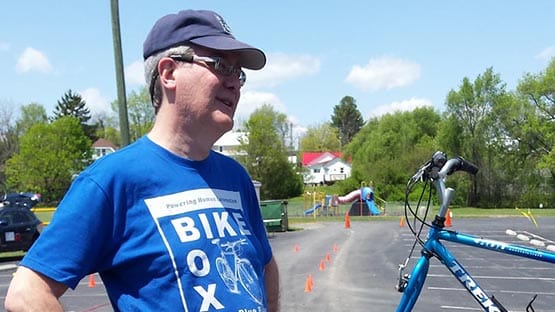
Randall Wolf’s love of cycling introduced him to the area’s unsheltered population, and through Bike Box of the Blue Ridge, he’s been able to help those who need it most with transportation to get them around town.
As part of his outreach with the nonprofit organization, he said, he’s gotten to know numerous individuals living in an area of Waynesboro that is often not talked about – an area known as Tent City.
He said that he has provided numerous bikes to residents of Tent City and their friends, and in talking to the residents, he wanted to know if there was more that could be done for them.
“I’ve heard of Tent City over the past few years,” Wolf said. “I didn’t know where it was.
“I finally said to one couple, you know, I’m glad we’ve gotten to where we’ve become friends, and I asked, would you invite me back into Tent City? I’d like to see where your living, and how you’re living and better understand your needs, to see if there’s any way I could help you beyond the bikes.”
Beyond the bikes
Randall, who ran for the Augusta County Board of Supervisors and the Virginia House of Delegates, wanted to learn more about Tent City, located on the banks of the South River, in downtown Waynesboro. In close proximity to the city’s Greenway, most of the unsheltered living there access the property by the Main Street Bridge on the opposite side of the river from the Pavilion and enter the private property through a city easement nearby.
“You know, it’s an amazing space,” he said about his visit to Tent City. “It’s a true neighborhood. It’s sort of like a tribe of people that really depend on each other. They know each other.
“And you know, it’s sort of a small valuable area that gives our neighbors that are homeless, living unsheltered, a safe space to be.”
He said he thought it might resemble camping – but after visiting, he’s pretty sure he could never manage to live in the same way.
“It was kind of an emotional roller coaster,” he said. “You know, it’s a hard, hard life. But at the same time, it was beautiful.”
He said a woman he met was weaving tree branches and vines into a makeshift fence to keep skunks out of their space while they sleep.
“It was a very welcoming space,” Wolf said. “And I left with the feeling of, you know, they still need some help. They need more help from the community. They are making it work, but they could use more help.”
For those of us in Waynesboro that haven’t ventured to Tent City, he said it felt safe to him.
“I had people welcome me into their camp. Some of them are small little compounds with multiple tarps and tents. And some are just individual little tents.”
Valley Community Services Board, Waynesboro Area Refuge Ministry, the Waynesboro YMCA and Lifeworks are just a few organizations that do provide outreach to the people living in Tent City.
He said he asked some of the residents what they need most, and they replied with a simple request: toilet paper.
Could Waynesboro do more to help?
Wolf said his visit left him feeling that the community could do more … that it would be helpful to have clean clothes, a place to get a shower, a bathroom … the simple things that we all take for granted.
Wolf said one solution would be having meals available more than three days a week, for example. He pointed to nearby communities like Charlottesville that provide a day center so that the unsheltered in the community can register a mailing address and do laundry.
“If they don’t have a place to get mail,” he said, “that means they have trouble trying to get a driver’s license or to do all the other things we take for granted. A day center would be a big boom in Waynesboro … a place for a warm meal every day, I think that would go a long way.”
Brian Edwards, the acting executive director for WARM and board chair for the organization, said a day center was being discussed before COVID-19 but was put on the back burner, as other needs arose during the pandemic.
And with the pandemic mostly behind us now, Edwards said a day center unfortunately isn’t likely on the radar in the near future.
He said that WARM is seeking an executive director and he’s hoping that whomever they hire, can have some input on the what can be done to meet the needs of the unsheltered community.
“We’d like to, when we have an executive director selected, kind of pick their brain and see how they think it can be achieved,” Edwards said. “But I don’t think we’re looking at anything like that within the next five years.”
At best guess, Edwards said, an effort of this size, would likely cost “upwards of $1.5 million.”
The Cold Weather Shelters, operated by WARM, are open from dinner time until about 7 a.m. each morning, leaving the unsheltered back outside during the day or seeking shelter in public buildings, like the library. This season, however, Augusta Expoland is providing WARM with a location for four weeks to offer 24/7 housing to the unsheltered during the coldest days of the winter.
“The administration at Expo has allowed us to use one of their buildings, at no cost, for four separate weeks, with 35 beds. We have to provide the meals there, so we’re trying to line up volunteers who can prepare two meals and then maybe a bag lunch,” Edwards said. “We’re not looking for three hot meals. We’re just basically looking for something that can sustain folks for the day.”
That brings on additional challenges and expense to WARM with more transportation needs (many of the area’s homeless do have jobs) and additional bagged or warm meals needed.
Getting back on their feet
Wolf said that most of the unsheltered people he has met are on waiting lists for housing. And affordable housing on their own, isn’t really an option, because there aren’t a lot of options.
“They’re trying to get their lives back in line,” he said. “You know, some of them have had addiction problems, but I think they’re really committed to getting back on their feet.”
Wolf has made it a mission, while a day center isn’t a possibility, to try to do his small part to make those in Tent City more comfortable, advocating to nearby property owners to consider placing a dumpster on their property or a porta potty to make unlivable conditions more humane for those who are homeless.
“I think the community as a whole in Waynesboro could provide better services to help them get back on their feet.”
Related stories
Bike Box providing transportation for those in need, one bike at a time
Waynesboro: Homeless agency needs $40k to get through winter months
The News with Crystal Graham: Homelessness in the spotlight
Homelessness: It’s not a their problem; it’s an our problem
COVID-19 funding blessing to homeless community, but emergency shelters closing soon










